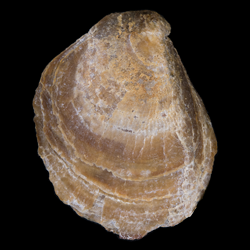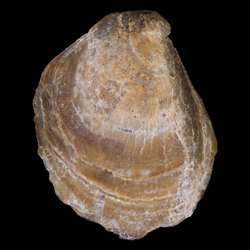
Anomiidae

Overview
Anomiidae Rafinesque, 1815
Common Name: Saddle oysters or jingle shells
Extant/Extinct
Key morphological features: The shells are thin, translucent, inequivalve—with the left (upper) valve more inflated and the right (lower) valve flat where the outline shape ranges from circular to oval. The shell is composed of a combination of aragonite and calcite and coloration is variable, but can include bright oranges and yellows. The shell is anchored to the substrate by a thick byssus which is calcified and permanently attached in most species.
SIZE: Up to ~150mm
Paleoecology: The Anomiidae are almost exclusively sessile, non-moving marine or estuarine bivalves. The species Enigmonia aenigmatica (Holten, 1803) is an exception as it crawls among mangroves and other intertidal environments. The Anomiidae can be found in temperate waters worldwide and inhabit a range of environments from the intertidal zone to the deep sea.
MOBILITY: Stationary
FEEDING MODE: Suspension Feeder
HABITAT: Epifaunal
Sources:
Cox, L.R., et al. 1969. Systematic Descriptions, in Cox et al., eds., Treatise on Invertebrate Paleontology, Part N, Mollusca 6, Volume 1. The University of Kansas and Geological Society of America. 489 pp.
Mikkelsen, P.M., and Bieler, R. 2008. Seashells of Southern Florida: Bivalves. Princeton, New Jersey: Princeton University Press. 503 pp.
